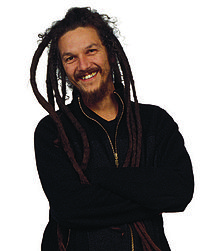Nándor Tánczos
| Nándor Tánczos | |
|---|---|

Nándor Tánczos with his trademark dreadlocks
|
|
| Member of the New Zealand Parliament for Green Party list |
|
|
In office 27 November 1999 – 26 June 2008 |
|
| Succeeded by | Russel Norman |
| Personal details | |
| Born |
29 May 1966 England |
| Political party | Green Party |
| Spouse(s) | Ngahuia Murphy |
Nándor Steven Tánczos (Hungarian pronunciation: [ˈnaːndor ˈtaːnt͡soʃ]; born 29 May 1966) is a Rastafarian social ecologist, researcher, educator, activist and political commentator. He is currently a councillor in the Whakatāne District and Chair of Permaculture in New Zealand. He is also co-director of He Puna Manawa social and political change agency.
He was a member of the New Zealand Parliament from 1999 to 2008, and represented the Green Party as a list MP.
Opinions of Tánczos vary greatly. Political opponents have tended to categorise him as a dangerous radical, often citing his role as a spokesperson for the Wild Greens, a direct-action group that claimed responsibility for uprooting a trial crop of genetically-engineered potatoes in 1999. Some regard him as a comic icon, not as an earnest, sensible politician. His supporters, however, reject both images of Tánczos, instead presenting him as intelligent, lucid, and constructive, a view backed up by more recent comments by conservative New Zealand politicians. Younger voters generally found "Nandor" more popular than older voters did.
First elected in 1999, he briefly lost his seat in the 2005 General Election, but returned to Parliament following the sudden death of Rod Donald just prior to the first sitting of Parliament, as he was next ranked on the party list. In 2006, he contested the male co-leadership of the Green Party, but was beaten by non-MP Russel Norman in a STV vote by delegates from electorates around the country at the 2006 AGM. In 2008, he resigned from Parliament, though he intended to remain a political activist.
...
Wikipedia
